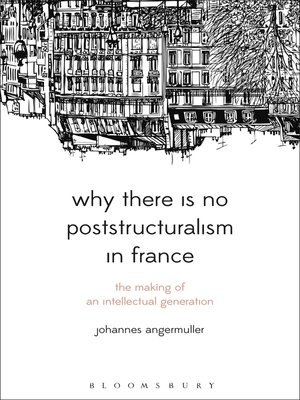Why There Is No Poststructuralism in France
ebook ∣ The Making of an Intellectual Generation · Bloomsbury Studies in Continental Philosophy
By Johannes Angermuller

Sign up to save your library
With an OverDrive account, you can save your favorite libraries for at-a-glance information about availability. Find out more about OverDrive accounts.
Find this title in Libby, the library reading app by OverDrive.



Search for a digital library with this title
Title found at these libraries:
| Library Name | Distance |
|---|---|
| Loading... |
French thinkers such as Lacan and Derrida are often labelled as representatives of 'poststructuralism' in the Anglophone world. However in France, where their work originated, they use no such category; this group of theorists – 'the poststructuralists' - were never perceived as a coherent intellectual group or movement.
Outlining the institutional contexts, affinities, and rivalries of, among others, Althusser, Barthes, Foucault, Irigaray, and Kristeva, Angermuller – drawing from Bourdieu's concepts of cultural capital and the academic field – insightfully explores post-structuralism as a phenomenon. By tracing the evolution of the French intellectual field after the war, Why There is No Poststructuralism in France places French Theory both in the specific material conditions of its production and the social and historical contexts of its reception, accounting for a particularly creative moment in French intellectual life which continues to inform the theoretical imaginary of our time.
Outlining the institutional contexts, affinities, and rivalries of, among others, Althusser, Barthes, Foucault, Irigaray, and Kristeva, Angermuller – drawing from Bourdieu's concepts of cultural capital and the academic field – insightfully explores post-structuralism as a phenomenon. By tracing the evolution of the French intellectual field after the war, Why There is No Poststructuralism in France places French Theory both in the specific material conditions of its production and the social and historical contexts of its reception, accounting for a particularly creative moment in French intellectual life which continues to inform the theoretical imaginary of our time.







